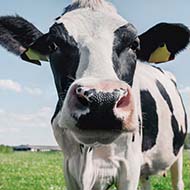
Investigation underway to identify the origin of the disease.
The Animal and Plant Health Agency (APHA) had confirmed a single case of Bovine Spongiform Encephalopathy (BSE) on a farm in Somerset.
The department said the animal died and has been removed from the farm, adding ‘there is no risk to food safety’. Movement restrictions have also been put in place while investigations continue to identify the source of the infection.
Chief veterinary officer (CVO) Christine Middlemiss explained: "A single case of classical BSE has been confirmed on a farm in Somerset. The animal died on farm and was tested as part of our TSE surveillance controls.
“Movement restrictions have been put in place on the farm. This is standard procedure until we have a clear understanding of the origin of the disease. This is further proof that our surveillance system for detecting and containing this type of disease is working.
“We recognise this will be a traumatic time for the farmer and we are on hand to offer advice through this difficult period. The UK’s overall risk status for BSE remains at ‘controlled’ and there is no risk to food safety or public health.”
A spokesperson for the Food Standards Agency added: “There are strict controls in place to protect consumers from the risk of BSE, including controls on animal feed, and removal of the parts of cattle most likely to carry BSE infectivity.
“Consumers can be reassured that these important protection measures remain in place and that Food Standards Agency Official Veterinarians and Meat Hygiene Inspectors working in all abattoirs in England will continue to ensure that the safety of consumers remains the top priority.
"The Animal and Plant Health Agency will now begin a thorough investigation of the herd, the premises, potential sources of infection and will produce a full report on the incident in due course.”
Since 2014, there have been five cases of confirmed BSE – also known as Mad Cow Disease - in animals not destined for human consumption. The condition was first diagnosed in the UK in the mid-1980s, and later spread to Europe, Canada, the USA, Brazil and Japan.



 FIVP has shared a survey, inviting those working in independent practice to share their views on the CMA's proposed remedies.
FIVP has shared a survey, inviting those working in independent practice to share their views on the CMA's proposed remedies.